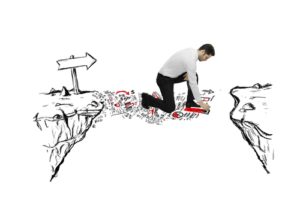 Most often, our clients come to a coaching session with a topic they want to explore.
Most often, our clients come to a coaching session with a topic they want to explore.
Our initial focus as the coach is to understand exactly what it is about their topic they want more clarity around, in order to move toward their desired future state. We need to understand the gap the client is wanting to close, not just their topic.
Let’s say your client brings the topic of balance; they want to have more balance in their life, because they feel they are at work too long, both because they are overwhelmed with work, and because working long hours is expected by their manager. Your client is resentful of working so hard, and about missing important family time each week night.
Here are some of the questions you might want to consider asking in order to understand the client’s desired outcome for the coaching session, and the gap they want to close. I’ll refer to some of the PCC Markers (there are many more of the markers I could refer to in this example). Even for those coaches moving toward MCC skill level, the PCC Markers are foundational behaviors to master.
By the way, these are not linear. For example, you might find your conversation is initially about the importance of balance to the client, before establishing the coaching outcome. And then you inquire about what needs to be addressed or resolved for them to get to that outcome. It’s a dynamic process.
Coaching Presence, Marker 4; “Coach exhibits curiosity with the intent to learn more.”
Active Listening, Marker 2; “Coach inquires about or explores the client’s use of language.”
The ever present mindset of a coach is one of curiosity, about your client “Way of Being,” which includes how they think, how they learn, how their past and present experiences impact their present actions, what they believe about themselves, the world, their situation, others…..and so on. Being curious about our client is a mutually beneficial experience, one where the coach is seeking to understand their client, and through questions or observations, support the client to articulate things about themselves.
In the example of your client bringing the topic of wanting more balance in their life, one of the initial places of curiosity might be the client’s definition of balance.
e.g. “How do you define balance for yourself?” This is Active Listening, Marker 2.
Beware of assuming our definition is also the client definition
We may have our definition of balance, yet it may not be our client’s definition of balance for themselves. So we are curious to know how our client defines balance. Another question could be,
“When you say overwhelm, what do you mean?”
“What are you exactly feeling resentment about?” (inquiring into emotional content is an important MCC skill).
Creating the Coaching Agreement, Marker 1; “Coach helps the client identify, or reconfirm, what s/he wants to accomplish in the session.”
The key word in Marker 1 is ‘accomplish.’ If your client brings balance as their topic, what do they want to accomplish around this topic? We are seeking to understand the gap the client wants to close around their topic of getting the balance they ideally want, so we know what they want to accomplish around their topic.
Example questions to establish the gap might include:
How would you describe the challenge you have around balance that you want to move forward in our coaching today?
What is the outcome you want to have around your topic of balance?
What do you want to accomplish in our conversation around balance?
When thinking about balance, what are you seeking to understand and clarify for yourself?
Creating the Coaching Agreement, Marker 2; “Coach helps the client to define or confirm measures of success for what s/he wants to accomplish in this session.”
This marker helps your client to know what they would consider a successful session to be for them.
Example questions:
How would you describe a successful session for you around this topic of balance?
How would you know you’ve accomplished what you wanted to know about balance by the end of this session?
You could help the client to establish the gap by asking two questions:
- How would you describe your current experience of balance?
- How would ideally like to be describing your experience of balance by the end of this session?
Then during, and near the end of the session, you can check in with the client.
How to use scaling questions
Some coaches use a scaling question to establish current state. For example, “On a scale of 1-10, where would you say you are now with balance?” Then the coach follows up with, “Where would you like to be by the end of our session?” Standard scaling questions like this are good for ACC and PCC skill level.
For MCC skill level, move away from standard questions, and customize. Allow the client to determine their own way of measuring current to desired state.
For example, “How would you describe your current relationship with balance?” Then you could follow up with, “How would you like to ideally be describing your relationship with balance by the end of our session?”
It is likely the client will give you their ideal version of balance, not just what they want by the end of this session. For MCC skill level, the coach is always listening in the broader life context of their client. The presenting issue is really an opportunity to expand learning. This focus on “expanded learning” is one of the Ten Characteristics of MCC Skill Level that I write about (along with inquiring into emotional content).
Creating the Coaching Agreement, Marker 3; “Coach explores what is important or meaningful to the client about what s/he wants to accomplish in the session.”
Another way to explore the gap the client has around their topic could be through understanding the importance of this topic to the client. In our example, it could be:
“What is important to you about having the balance you ideally want?”
“What has made this desire to have more balance important to you right now?”
By allowing your client to reflect on the importance of balance to them, they may further understand the gap from where they are now, to where they ideally want to be.
Creating the Coaching Agreement, Marker 4; “Coach helps the client define what the client believes s/he needs to address or resolve in order to achieve what s/he wants to accomplish in the session.”
I love the intent of this Marker! Just like Marker 3 above, which gets more into the “Who” of the client (their beliefs, values), this marker also gets further into the “Who.”
Example questions:
What do you feel we’d need to address in order for you to have the balance you desire?
What might need to be resolved in order for you to have the balance you seek?
These types of questions might have the client talk about how to address her manager’s expectations, and possibly her self-expectations.
With this level of inquiry, you and your client can design a more meaningful coaching session outcome.
Managing Progress, Marker 1; “Coach invites or allows client to explore progress towards what s/he want to accomplish in the session.”
This is one of the markers which allows your client to pause and consider where they started, and the progress they’ve made in closing the gap around their topic/outcome. It’s really quite magical to hear your client’s emerging awareness when you ask a question like, “When you think about where you started our conversation, where are you now with your thinking on balance for yourself?”
In closing…
The importance of establishing what the client wants to accomplish about their topic, cannot be overstated. Otherwise you risk exploring the topic and having a great conversation, yet your client is no closer to getting the clarity they seek.
Are you preparing for your first or next ICF Credential?
Do you want to “Sharpen the Saw” as a Coaching Professional?
February and March, 2017 commencing Mentoring Groups released!
February commencing group is for ACC and PCC skill levels. March commencing group is for MCC skill level.
Start early with your mentoring requirements in the year of your renewal, especially if you plan to submit for your next credential instead of renew your current one. You will need to submit your application by mid August in order to accommodate the 18 week ICF process.
The Mentor Coaching Group program is approved for 24 ICF Core Competency CCE units! (including 10 hours of mentor coaching)

Carly Anderson will be ‘flying solo’ in 2017 as Karen Boskemper goes on to work on other projects. I will her miss her wisdom and support, and yet wish her all the best in her next endeavors.
We offer an awesome mentor coaching group and individual program that has many exclusive offerings for our participants. You can read some testimonials here
We have been trained by the ICF to assess using the new PCC Markers. Carly also assesses for the ICF MCC and ACC credential.
One of our unique offerings is an extensive library of MCC, PCC and ACC coaching sessions for our participants to listen to, evaluate, debrief, and learn from, along with The Target Approach to demystifying the ICF core competencies. These are incredibly valuable learning tools, and will accelerate your understanding of competency distinctions.
Carly has created products to more deeply understand Establishing the Coaching Agreement and Ten Characteristics of MCC Skill Level.
Here’s where you’ll find more about The Mentor Coaching Group
